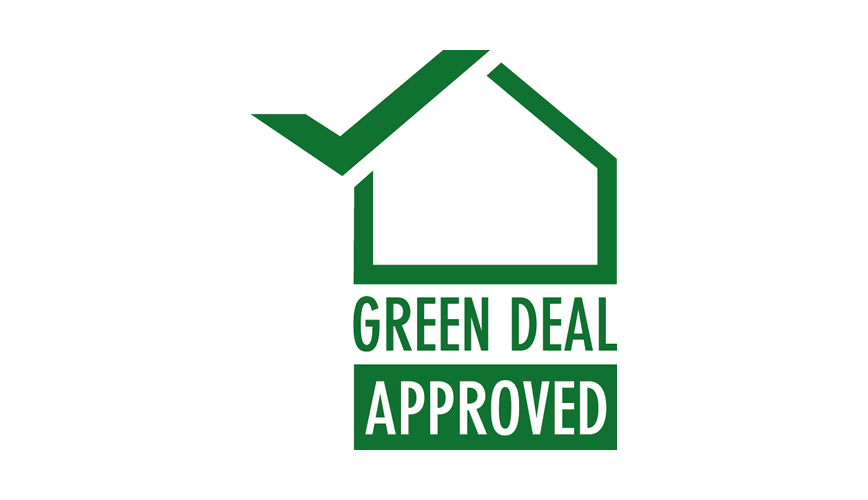
I live in a mid-terrace house that was built early in the 20th Century using solid brick construction. It's one of those typical suburban houses with nice bay windows and a small gas fireplace in the lounge, the sort you find all over the UK. Like most houses of this type, it is draughty, badly insulated and very inefficient in its energy use. I am starting a project to fix that and I would like to have the primary improvement works done under the Green Deal.
The Green Deal is a new initiative by the UK government that became effective at the end of January and that aims to reduce the number of buildings that require high energy spendings in order to operate. It is designed so that it can benefit landlords and tenants alike, as well as owner occupiers. The primary way in which it does this is through easy financing that is linked to the property rather than the owner or occupier: the idea is that once the works are done, the energy bills of the property will go down. So the loan that finances the project is repaid against savings on the electricity bill. If the property is sold, the remainder of the loan is sold with it and keeps being applied to the electricity bills of that property. This has a number of advantages for tenants and landlords:
- An initial survey of the property is done by an accredited assessor who will identify what are the most cost effective measures for that property based on its characteristics and the way the people live in it,
- There is no upfront cost apart from the cost of the initial assessment,
- As the loan is made against the property rather than a person, there are no credit checks, which makes the finance and the whole scheme much more accessible to people who typically find it difficult to obtain credit, such as people who are self-employed or have bad credit history,
- You can receive cashback repayments against particular measures,
- You can have additional works that are not covered by the Green Deal carried out at the same time, as long as you finance them separately.
Of course, there is a price to pay for those facilities: the interest rate on Green Deal financed projects is around 7.5% as explained by Which? in their guide. However, the Green Deal comes with a golden rule stating that the price of repaying the works should never be higher than the energy savings that result from it, meaning that energy bills for any given property should not increase. The deal is also flexible: you don't have to have the works financed through the Green Deal, you can decide to finance them independently, including by paying cash or financing it via your mortgage or any other form of loan.
All in all, it's a promising scheme and everybody in the country who owns or lives in an average property should definitely consider getting improvement works done under the scheme. This is exactly what I intend to do and I decided to start the process.
The first step in doing anything under the Green Deal is to find a Green Deal Approved Assessor. The obvious choice would be British Gas as they are the big player in the scheme and have everything in place already. I called them late last year but I also wanted to see what the smaller players in the field are like, partly because I'd rather give my money to a small business but also because I wanted to see how they compare with British Gas.
In order to do this, I went to the Oversight & Registration Body's web site, entered my postcode in the search box on the assessor page and went down the list. For each assessor, I had a look at their web site and gave them a call based on the assumption that talking to a real person gives you a better feeling for what the service is like. By doing that, I only contacted companies that are officially registered as Approved Assessors so I could reasonably expect them to know what the Green Deal is about and to have geared up to answer calls from prospective customers who are interested in the scheme. As such, I expected to have my assessment booked in no time at all. That was the theory. Practice didn't quite live up to it. Note that all companies were called on Tuesday 12th February so just under a week ago.
Take 1
A small company that seems to have been created specially as a Green Deal assessor. The Green Deal Approved logo is prominently displayed on the web site. When I call, the lady on the phone understands what I want but does not inspire confidence and avoids answering my questions. When challenged about the £150 fee they charge for an assessment, compared to £99 for British Gas, the answer is not satisfying. She fails to get any of my details or tell me how to arrange booking an assessment visit.
Take 2
Another small company specialising in Green Deal assessments with the Approved logo prominently displayed on the web site. When I call, the lady on the phone advises me to fill in their online form and promises that someone will be in touch once I do that. I do. Nobody has called me yet.
Take 3
A more established company specialising in green energy improvements, in particular solar PV. This is interesting as I would potentially like to include other improvements than what is covered by the Green Deal and am quite keen to talk to people who can do that. The Green Deal Approved logo is not displayed anywhere on their site and the words Green Deal are nowhere to be seen, which rings alarm bells. My concerns are confirmed when I call as the lady I speak to has no idea what I'm talking about. She promises someone who does know about it will call me. No call so far.
Take 4
A small company with a simple web site where the Green Deal Approved logo is displayed. When I call, the gentleman on the phone knows what I'm talking about but tells me they are unable to take any booking at the moment because they are waiting for some software from the government that is apparently essential for them to do their work. I'm not sure what that software does nor why they can't do anything without it. I am also a bit surprised that a business would not have a plan B in order to avoid having a dependency on the government delivering a piece of software. They will call me back at the end of the month, when they hope they will be able to take bookings.
Take 5
A very extensive web site, with the Green Deal Approved logo displayed and a lot of information on the Green Deal. When I call, the lady on the phone is very knowledgeable about the deal and offers to explain the details to me. Their prices are reasonable and she takes my details, including details of when it would be most practical for me to have an assessment done and assures me that they will be passed on to the assessment team who will call me to arrange a site visit. At last I seem to be getting somewhere and indeed I got a call 2 days later to that effect. The agreed date is within the next 10 days, which is not bad.
Conclusion
It took more effort than I expected to get that initial assessment booked but I got there in the end. Hopefully those issues will get ironed out as the Green Deal gathers pace. I shall report here on what happens next with my Green Deal experiment.

